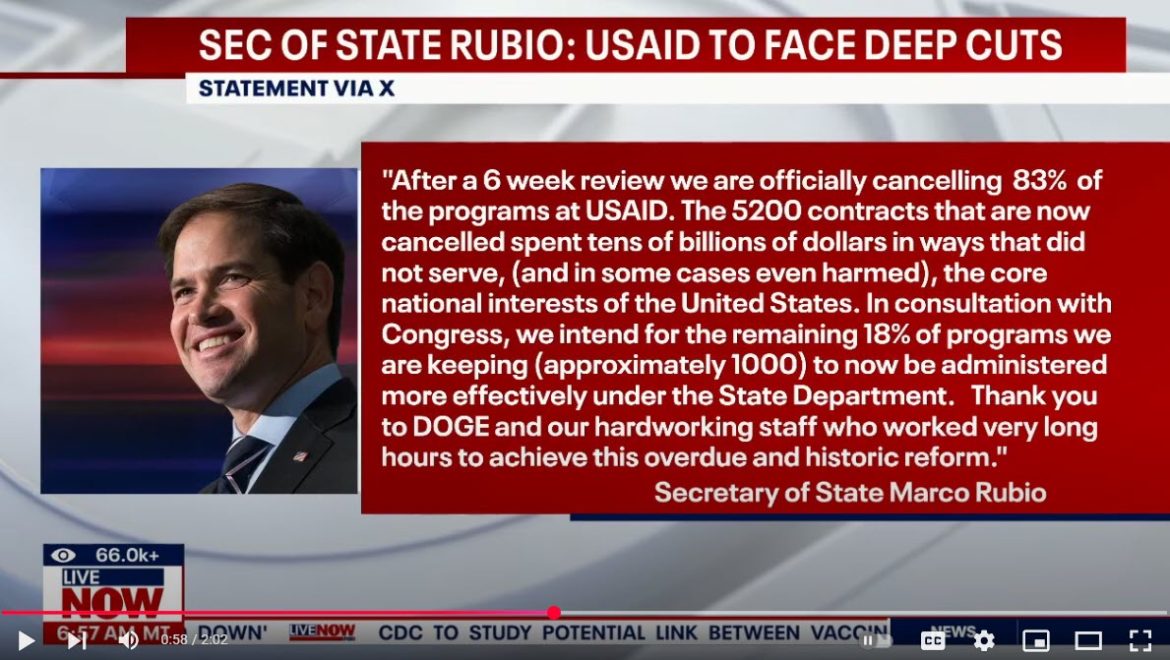Secretary of State Marco Rubio has announced a sweeping overhaul of the U.S. Agency for International Development (USAID), canceling 83% of its existing programs. In a post on X, Rubio stated that 5,200 contracts, amounting to tens of billions of dollars, have been terminated. He justified the move by claiming that these contracts did not serve U.S. interests and, in some cases, actively harmed national priorities.
The decision to cut the majority of USAID’s programs is part of a broader initiative by the Trump administration to reassess and restructure foreign aid spending. President Trump has long criticized USAID for what he considers excessive spending on international development projects with little return for American taxpayers. In one of his campaign speeches, he vowed to “bring accountability to every dollar spent overseas” and pledged to reevaluate all foreign aid programs upon returning to office.
The cuts are expected to impact aid programs across multiple regions, including Africa, Latin America, and parts of Asia. The majority of the affected contracts reportedly involved initiatives related to climate change, gender equality, human rights, and public health. Some of these programs were designed to assist communities in developing nations by providing food security, educational resources, and healthcare infrastructure. The move has sparked backlash from international organizations and U.S.-based aid groups that relied on government funding to continue their humanitarian work.
Among the most affected regions is sub-Saharan Africa, where USAID has long played a role in supporting disease prevention programs, economic development projects, and food aid initiatives. In Latin America, aid organizations fear that the elimination of these contracts will lead to an increase in migration toward the U.S., as poverty and instability grow in countries previously supported by USAID funding.
The restructuring effort was coordinated with the newly formed Department of Government Efficiency (DOGE), led by billionaire entrepreneur Elon Musk. DOGE was created to identify government waste and redirect federal spending to what the administration deems “high-priority national interests.” While Musk has not publicly commented on USAID’s mass contract cancellations, he has previously expressed skepticism about U.S. foreign aid, questioning its effectiveness in achieving tangible results.
The decision has drawn intense criticism from both Democratic lawmakers and international relief organizations. Some Democrats have accused the administration of acting unilaterally to dismantle critical aid infrastructure without consulting Congress. Several humanitarian organizations, including the International Rescue Committee and World Food Program USA, have issued statements warning that these cuts could have devastating consequences for vulnerable populations.
Legal challenges are expected in response to the sweeping cancellations. Some aid groups argue that the executive branch does not have the unilateral authority to terminate certain congressionally approved funding programs without legislative oversight. Constitutional experts suggest that the administration’s ability to cancel contracts could be challenged in court, potentially delaying or reversing some of the terminations.
Despite the controversy, Secretary Rubio is defending the decision, stating that the U.S. must “prioritize its resources wisely” and that funding should be directed toward programs that directly benefit American citizens. He has also hinted that a new framework for foreign aid will be introduced in the coming months, with a stronger emphasis on trade-based economic partnerships rather than direct financial assistance.
As the fallout from this decision continues to unfold, aid organizations, lawmakers, and foreign governments are bracing for the long-term impacts of USAID’s dramatic restructuring. With 83% of its programs now eliminated, the future of U.S. foreign assistance faces an uncertain path, leaving millions who relied on these programs in limbo.



